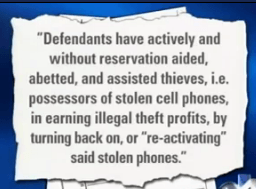
AT&T's bill padding.
No other single corporation has spent more trying to influence legislators in the state of California than AT&T.
That conclusion was reached as part of a report by the Los Angeles Times documenting AT&T’s millions in political donations and an army of lobbyists that effectively kill just about every measure the company opposes.
Some of the biggest checks change hands at the two-day Speaker’s Cup, the Godzilla fundraising event for California state Democrats.
During last year’s outing, those who attended were handed goody bags worthy of a Hollywood event. Free products included a brand new iPad that came with a thank you note co-signed by Assembly Speaker John A. Perez (D-Los Angeles) and AT&T’s top lobbyist — its chief of government relations.
This year’s event, to be held May 5-6, is priced at an average of $12,000 per ticket, but many legislators get free passes for a weekend that includes unlimited golf, wine, gourmet food, body wraps and hot-stone massages.
Come for the golf, but stay for the lobbyist-legislator hobnobbing.
At past events, AT&T’s state president bounded across the green shaking hands with every legislator he could find, and those he couldn’t just had to wait by the mailbox. Every California legislator is the recipient of at least $1,000 in the form of a campaign contribution. More important state lawmakers earn much more from the phone company, often tens of thousands of dollars.
But AT&T’s “concierge service” for lawmakers doesn’t stop with golf outings and campaign checks.
AT&T spends more than $14,000 a day on political advocacy in California, and when a lawmaker can’t get tickets to a premiere event, concert, or playoff game, one phone call to an AT&T lobbyist is usually all it takes to remedy the situation. Hundreds of free tickets were dispensed, according to the Times, for everything from basketball playoffs to Disney on Ice.
 Lawmakers deny AT&T’s iPads, cash, and tickets have any influence over their decisionmaking, a view scoffed at by watchdog group Common Cause.
Lawmakers deny AT&T’s iPads, cash, and tickets have any influence over their decisionmaking, a view scoffed at by watchdog group Common Cause.
“What these things do is create a sense of gratitude and indebtedness,” Derek Cressman, western states director for Common Cause said. “It’s basic human nature: If someone does something nice for you, you want to do something nice for them.”
The number of favors returned by lawmakers for AT&T’s benefit:
- Bill to force phone companies to be more transparent about cellphone fees: died in legislature;
- Bill to end monthly charges for unlisted numbers: died in legislature, and AT&T and since raised the rates on the service;
- State controls on landline pricing: eliminated
- A bill to help consumers stop unwanted delivery of the Yellow Pages: defeated
- A measure to deregulate cable TV franchising and move it to the state level for the benefit of AT&T U-verse: passed
“Every day I look at a case and I think, well, if they [AT&T] don’t care, we have a good chance,” Denise Mann from the Division of Ratepayer Advocates told the newspaper. But if AT&T’s corporate offices do care, she added, “all we can do is appeal to conscience, reason and the public interest.”

Wolk
That often isn’t enough. Sen. Lois Wolk (D-Davis) learned that first-hand when she attempted to introduce a measure to curb phone cramming — placing unauthorized charges on consumer phone bills. The negotiated measure was well on the way to passage in the state legislature until AT&T’s chief operative showed up.
Wolk was amazed to find AT&T’s Bill Devine taking a front row seat in the committee room reserved for legislators and staff to listen to her revised bill. When she finished, Devine headed for the microphone and delivered his own version of how the bill should be written.
Wolk was out of her league. A common-sense measure that had received early support from legislators suddenly was in deep trouble as fellow legislators quickly fell in behind Devine’s reinterpretation of the bill. The bill was put on hold and died a quiet death one week later.
Nobody spends more than AT&T on influencing public officials in the state government. In the past 13 years, the phone company has spent more than $47 million on lobbying, more than twice the second biggest corporate spender — Edison International — has spent in the state. That doesn’t include the $1 million+ in political campaign contributions doled out each year.
AT&T takes care of the political advocates who take care of them, as well.
The Times reports that ex-lawmakers, regulators, and staff members of the legislature have all found work in lobbying and public relations firms that include AT&T as a client.
Even non-profit groups who advocate AT&T’s positions on telecommunications issues stand to win. The company cuts checks to groups like United Way and the Boys and Girls Club who in turn write letters to legislators requesting they support AT&T’s agenda.
 AT&T will increase the capacity of Tampa Bay’s cell phone network to handle 4-5 times the traffic it used to, to serve the needs of the upcoming three-day Republican National Convention to be held in the city in late August.
AT&T will increase the capacity of Tampa Bay’s cell phone network to handle 4-5 times the traffic it used to, to serve the needs of the upcoming three-day Republican National Convention to be held in the city in late August.

 Subscribe
Subscribe






